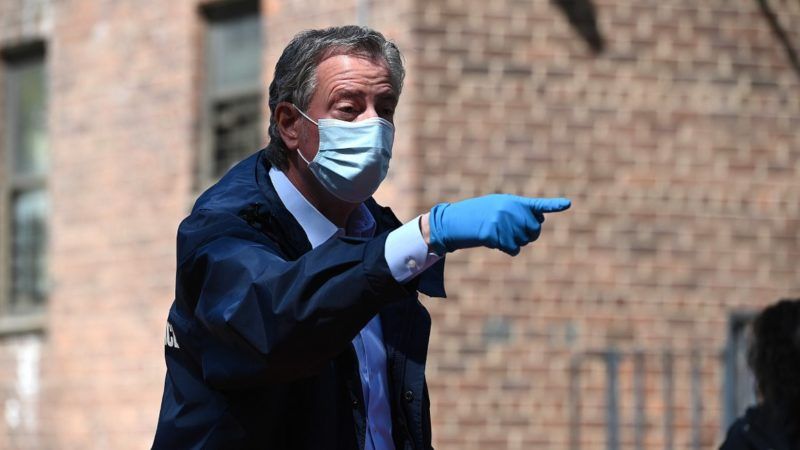De Blasio Threatens To Arrest Hasidic Jews for Congregating To Mourn the Death of a Rabbi
On the same day Brooklyn’s Hasidic Jews came out for a funeral, hundreds were gathering elsewhere in New York City to watch a military flyover.

New York City remains one of the United States' biggest hotbeds of COVID-19 infections and deaths. More than 12,000 deaths have been attributed to the virus in the Big Apple, or about 20 percent of the estimated deaths in the United States so far.
So it's easy to see why leaders (and citizens) might be very upset about a group of Hasidic Jews violating bans on large gatherings, congregating in public, on the street, in Brooklyn for the funeral of a rabbi who died from COVID-19 complications.
It would take a very insensitive leader, however, to decide to target their anger and frustration at Jews as a collective group, singling them out. And it would be a very stupid and ill-advised response to threaten such people with arrest, given that New York City's jails are incubators for the coronavirus.
So, ladies and gentlemen, here's New York City Mayor Bill de Blasio:
My message to the Jewish community, and all communities, is this simple: the time for warnings has passed. I have instructed the NYPD to proceed immediately to summons or even arrest those who gather in large groups. This is about stopping this disease and saving lives. Period.
— Mayor Eric Adams (@NYCMayor) April 29, 2020
The New York Times reports that these Hasidic Jews had gathered Tuesday evening to mourn the death of Rabbi Chaim Mertz. New York Police Department (NYPD) officers were on hand to try to control the flow of crowds and keep people distant from each other, but they didn't fully succeed. This clip from CBS shows most of the people at the gathering were wearing masks, but they were still frequently standing too close to one another:
De Blasio's response has been rightfully blasted by members of New York's Jewish community. First, the obvious: He's singling out Jews as though their violations of gathering guidelines are somehow special or different from when other groups of people do the same thing. Second, some important context: On this same day, groups of New Yorkers watched the Blue Angels and Thunderbirds soar overhead in a White House-ordered display honoring essential workers. Images posted on social media and shared by news outlets show people gathering in clumps and not engaging in proper social distancing. So de Blasio's response leaves the impression that it's wrong for Jews to gather to mourn the death of a religious leader, but totally fine to gather to watch our government masters waste our tax dollars on air shows.
Should de Blasio actually attempt to single out Jews for NYPD enforcement, he potentially runs afoul of religious freedom protections. Enforcement of these social gathering rules is supposed to be applied neutrally. For the city to target gatherings of Jews but not other gatherings would be similar to attempted bans on drive-in church services in Kentucky and Mississippi. A federal judge in Kentucky stopped the Louisville mayor's ban because this rule restricted religious gathering in a way that didn't seem to apply to other types of gatherings of a similar nature. It wasn't neutral.
Finally, de Blasio's response shows he is more interested in enforcing his will than effectively preventing the spread of the coronavirus. He's threatening people with arrest for violating social distancing rules, but New York's jails themselves are massive violators of social distancing rules and are spreading COVID-19 among both inmates and staff. Nearly 10 percent of the population at Rikers Island has been diagnosed with the coronavirus. That's much higher than the infection rate among free New Yorkers (though researchers are still trying to get a handle on how many people might have been infected and didn't develop symptoms, and the infection rate in the city might be much higher than what has been recorded).
Threatening people with arrest for violating stay-at-home orders and social distancing guidelines doesn't show power or leadership; it's a sign of weakness, an inability of a leader to convince the public to trust him or her to manage a crisis. When people engage in activity that puts them at a higher risk of developing the coronavirus, it's completely absurd to threaten them with imprisonment that most definitely increases that very same risk.


Show Comments (133)